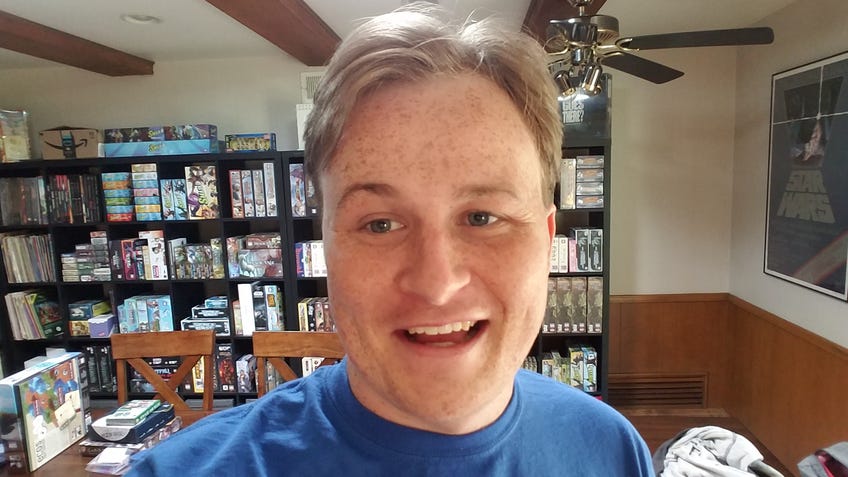Stonewall Uprising: The Fight for Gay Civil Rights creator on representing LGBTQ+ history in a board game
“I understand that playing as The Man may be uncomfortable.”
Stonewall Uprising: The Fight for Gay Civil Rights is a new board game designed by Taylor Shuss set to be released later this year.
The title has sees two players taking on the role of either Pride - representing the LGBTQ+ community during the 1960s, ‘70s and '80s - or The Man, representing the system attempting to repress and control Queer people.
Prior to the game’s release, Dicebreaker spoke with Shuss about the design choices behind Stonewall Uprising, the decision to focus on the past and why LGBTQ+ themes aren’t more common in the board gaming industry.
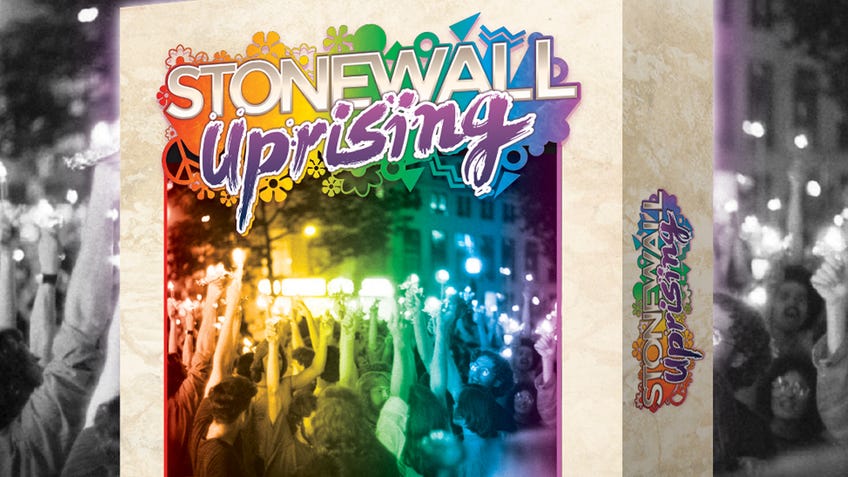
How far is the theme of Stonewall Uprising reflected in its gameplay?
The theme is heavily reflected in the gameplay. Stonewall Uprising is a board game, so it’s abstracted in various ways, but it’s all there. The two players are engaged in a tug of war over three areas. These areas are Systemic Support, Public Opinion and Individual Support, and getting each far enough on your side will help you (or hinder your opponent) and then reset that area.
The people who fought for their civil rights were fighting for their livelihoods, whereas for The Man it was rarely something fought for tooth and nail.
Many prominent figures appear in the game on the Pride side, from Marsha P. Johnson to Frank Kameny and Gilbert Baker, whereas The Man has no individuals on their side. The people who fought for their civil rights were fighting for their livelihoods, whereas for The Man it was rarely something fought for tooth and nail. What that translates to in real life is that the people on Pride’s side stick around and do not give up, but if The Man takes too many losses they walk away. In gameplay terms, that means that Pride will see recurring faces throughout the decades, but The Man only deals with concepts and impersonal organisations.
Pride, as a movement, is organic and grassroots. In Stonewall Uprising that’s reflected through the fact that their deck is much more malleable than The Man’s. The Man can try to shift with the times, but it is much more awkward and less reliable, because smaller grassroots movements are agile and change easier than something as hulking as The Man, so typically by the end of the game Pride has a smaller and sleeker deck, while The Man’s is larger and more unwieldy.
Why did you choose to make the game a two-player title where one player is the 'Man' working against the Pride movement?
When I was concepting what a game about Stonewall might look like, I had two immediate ideas. The easier idea, I felt, was to make a cooperative game set during the three nights that the actual Stonewall Uprising took place. This game would be fully cooperative and likely have players fighting directly against some AI-controlled police force mirroring what happened on June 28th, 29th and 30th of 1969. My issue here is that this concept lacks much depth or heart - it’s not making the players reflect, or challenging them in any meaningful ways. Not all games need to be challenging to play, but if I was to make a game about Stonewall, surely the theme and setting should have a more serious tone.
My other idea was to have one player play as Pride while the other played as The Man. This concept was inspired by Amabel Holland’s This Guilty Land in its core structure. In this version of the game, one player has to play as the antagonist and work against equal rights.
I often found that playtesters have a more difficult time playing as The Man since they have to take actions that they, as a person, disagree with.
This pitch hit some intriguing notes, combining the gameplay dynamics of a two-player game while placing both players in a key moment in the gay civil rights movement.
I understand that for many playing The Man may be uncomfortable. I often found that playtesters have a more difficult time playing as The Man since they have to take actions that they, as a person, disagree with. There are gameplay moments that make many uneasy, but I feel that is when the game is at its best.
We are also looking into a solo mode for the game where you can just play as Pride, but nothing is final as of yet.
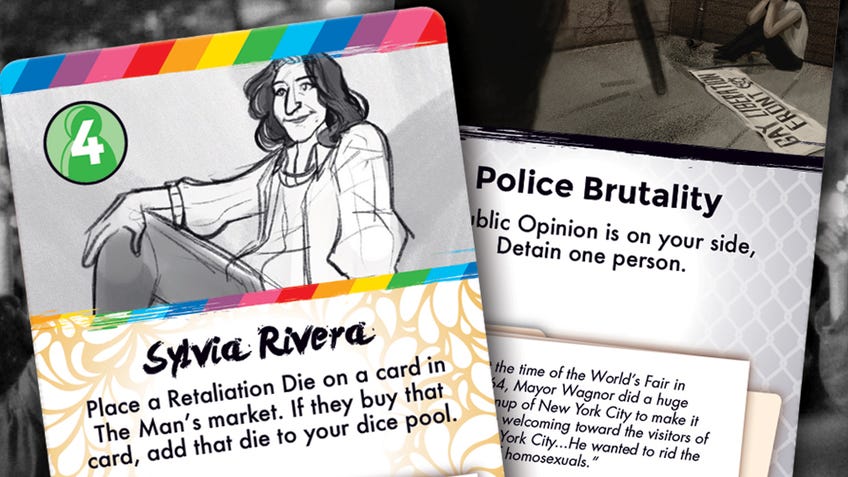
What does making a player take the role of the opposition to Pride achieve in the game?
It is surprisingly hard to play as The Man for many. Players say phrases like “I’m going to play Police Brutality and detain two people.” The verbs and nouns in this game have been deliberately chosen for maximum impact, and it shows during play. They know they are doing terrible things to an already marginalised group, and as the game progresses it gets more and more difficult not to feel discomfort and unease. This all comes to a head in the ‘80s when the cards that The Man buys decide how many preventable AIDS deaths are going to occur, measured in the thousands.
To many it may seem like The Man should be a terrible thing and have no remorse, but I find that I often have the most sympathy for the player playing as The Man. Deploying hate groups, blackmail, detaining and demoralising people - these are not easy things to talk about but they are all part of our shared history. Tackling that is a righteous endeavour, while perpetuating it is enough to make one’s stomach churn.
I think there is a lot of value in looking at how far we’ve come, and getting a holistic view of these events can help people understand what occurred and why.
Why focus on the past, instead of creating a game set in the present and tackling the issues that members of the LGBTQ+ community deal with today?
I think there is a lot of value in looking at how far we’ve come, and getting a holistic view of these events can help people understand what occurred and why. Events from the ‘50s and ‘60s are in the game to give players a view of what the status quo was like, and when things start to snowball. Pride parades start popping up for the anniversary of Stonewall. Homosexuality gets removed from the DSM (Diagnostic and Statistical Manual of Mental Disorders). The Gay Liberation Front is founded. Harvey Milk gets elected.
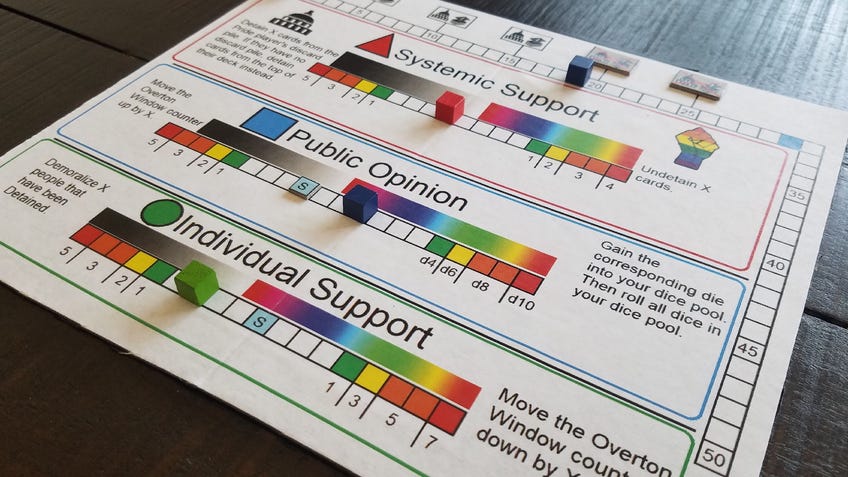
There is also much to be said about the fact that the majority of these events are still in living memory. While I am deeply proud of how far we’ve come, I am also unsettled by so many things that were just another facet of life back then. Including: people in white hoods marching on Capitol Hill, gay bars being raided to protect a city’s public image, teachers losing their jobs for no crime other than being gay.
There are definitely parallels to the above moments in history unravelling in front of us, but things as a whole are getting better. It has been a long process, but it’s happening, even if it’s only generationally. This isn’t the case everywhere though, and my heart goes out to Queer people in places like the United Arab Emirates, Russia and the People’s Republic of China.
Events that occur during your lifetime, especially ones that were important to you personally, are difficult to detach from. Plus some of these issues are still playing out today making them a minefield to work on. What if we learn that influential person X in the modern Queer civil rights movement is an abuser or anti-semite? What if history is not kind to predictions in the game and it becomes dated?
And then there’s also the fact that because of the detachment from modern concerns and politics it makes the game more approachable to wider audiences. Curious about how the American Queer civil rights movement got its start? Here you go! Worried that the game will start a fight? Fairly unlikely with the timetables used.
The title of the game is Stonewall Uprising: The Fight for Gay Civil Rights, but the Stonewall movement includes all members of the LGBTQ+ community. Why focus on gay civil rights in particular?
The game doesn’t just focus on gay civil rights, it focuses on the rights of everyone who identifies as Queer.
In everyday life today, I prefer to use the word Queer instead of gay or LGBTQ+. It’s super broad and inclusive, and most people understand what you’re trying to say. The problem is that wasn’t always the case, and in the decades where this game takes place that word was a widely-used slur towards the community. So out of respect for those that actually lived and died throughout these events, that was off the table.
Prominent women from the movement will be in the game, like Marsha P. Johnson, Del Martin, Phylis Lyon and Sylvia Rivera.
The other option was LGBT or LGBTQ+. Obviously the version with the Q couldn’t really coexist with the slur, as previously mentioned, so that was nixed. LGBT was a real contender, but that term is actually fairly recent. Historically the movement has gone through a number of names, starting with the homophile movement in the 1960s, then jumping to gay in the ‘70s, and coming up with LGB in roughly the ‘80s which evolved into LGBT in the late ‘80s.
With all that in mind, gay became the word of choice to describe the movement in that moment. It isn’t there to denigrate or imply anything nasty, it’s simply the term that ended up defining the movement when the game is set.
And to prove this point further, the individual people in the game are not just gay men. Prominent women from the movement will be in the game, like Marsha P. Johnson, Del Martin, Phylis Lyon and Sylvia Rivera.
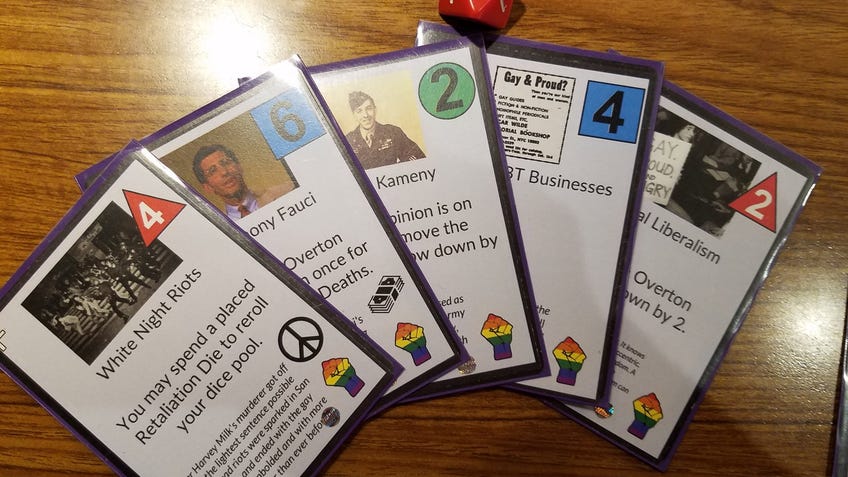
Did you hire a sensitivity writer and consultant/s to help with the theme of Stonewall?
We are looking into this at the moment. I spent plenty of time researching the events involved in the game with an early focus on the 1960s which dove-tailed into the 1970s and 1980s as the scope of the game expanded. David Carter’s book Stonewall and the Queer documentary Word is Out were some of my favourite materials to go through and I would easily recommend either to anyone interested in Queer culture.
History is vast, so the possibility I have missed people and events is entirely plausible. I am not a historian by trade but I tried to make sure the people I read about and heard from were well-represented in the game.
Why do you think LGBTQ+ subjects aren't more commonly chosen themes in board game design?
I suspect it’s a two-part issue.
First off, as a thematic trapping for a game it’s a lot of research. No designer needs to read books on the intricacies of Mediterrean shipping routes or how they actually traded with each other. Generic bland themes are used because they are inoffensive and easy to digest. In order to even start on Stonewall I read several books and sat through a documentary or two and then I made my first draft.
The moment a game has a challenging or controversial theme all eyes are on it. I have felt this with Stonewall and have seen it with other games as well.
The other part of the equation is the audience. Topics that are neutral do not draw criticism or eagle-eyed players discussing how inaccurate they are to real life; they just sit back and enjoy the way the game works. There is no heated debate over whether the trains in Ticket to Ride are accurate, for example. The moment a game has a challenging or controversial theme all eyes are on it. I have felt this with Stonewall and have seen it with other games as well.
So in sum, the fact that actual research needs to be done, plus the additional scrutinising, makes for an environment that incentivises easier to digest themes. You get broader appeal, better sales, less critical eyes on it and almost no chance of problematic elements. Writing it all out makes me even wonder why I bothered to make a game like this, but then I remember - It’s important to me.
